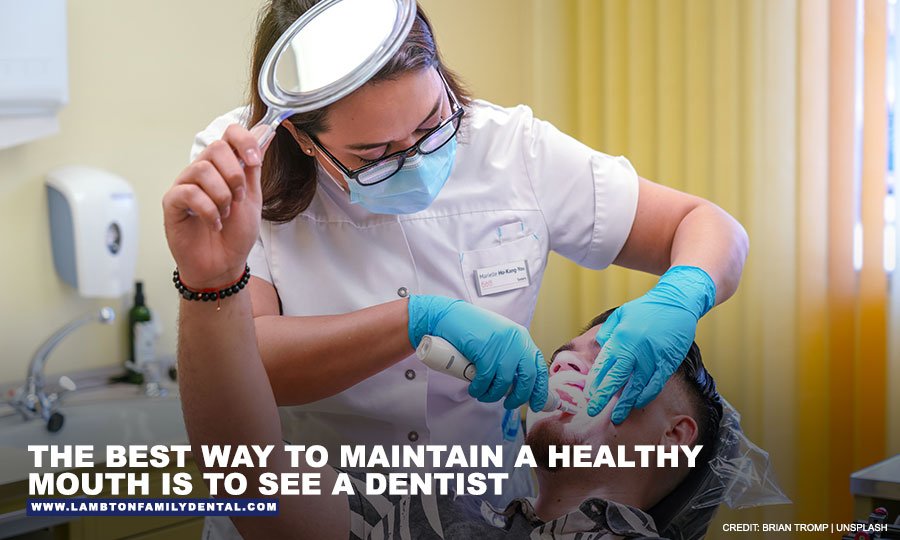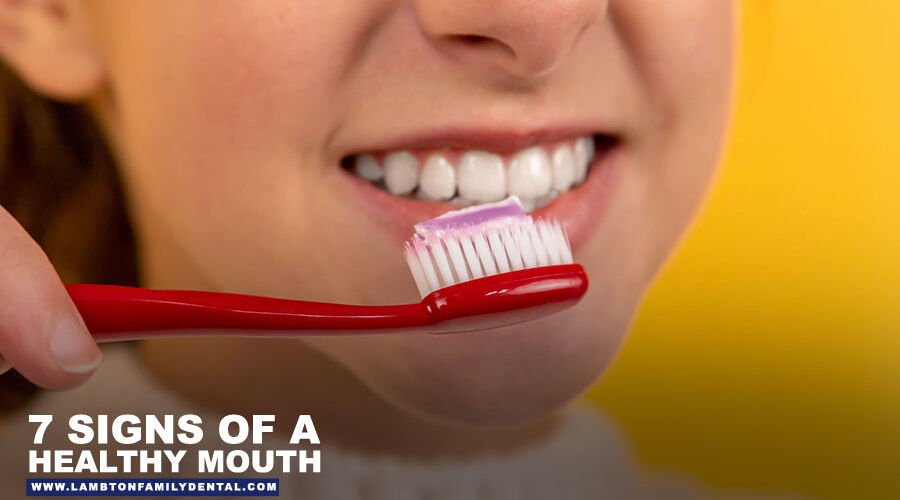The importance of oral health cannot be overstated. You may detect probable illness by looking for signals in your mouth. As a result, maintaining the health of your teeth, gums, and tongue is essential. Do you know the difference between a healthy and an unhealthy mouth?
Often, people only get warning signs regarding their oral health but not many are aware of the green flags. There are several benefits to routine dental and periodontal examinations. If you don’t know how to tell if your mouth is healthy, here are some excellent signs.
1.Healthy Teeth
Teeth are something people notice first. One indication of good oral health is having healthy teeth. Although it should go without saying that teeth should be free of cavities, the dentist or dental hygienist also looks for a variety of other health-related indicators when inspecting your teeth. They will look for the following factors to determine the health of your teeth:
- Staining
- Decay
- Fractures
- Chips
- Sensitivity
- Misalignment
- Poor Dental Work
2.Healthy Gums
Examine your gums very carefully. Instead of being red or white, bloated or sensitive, they should be pink and firm to the touch. Your teeth should feel secure in their sockets and should not be wobbly or loose. There should be no flaps, pockets, or areas where the gums appear to be receding from the tooth.
Daily flossing keeps gums healthy and eliminates pockets and other areas where germs can gather and lead to damage, rotting, and bad breath. In addition to reviewing your x-rays, your dentist will examine your gums to look for any gum pockets. Gum health is a good sign of overall wellness.
3.Proper Tooth Spacing and Jaw Alignment
In addition to looking at your teeth, your dentist will also look at how your teeth fit into the rest of your mouth and jaw. Teeth that are correctly straightened and aligned are much simpler to brush and floss. Proper mouth health care results in fresher breath and fewer areas where cavities or gum disease.
Crowding, commonly referred to as “malocclusion,” can affect chewing and regular digestion. Crowding can also be linked to bruxism (clenching or grinding), gum disease, and jaw problems including temporomandibular joint disorder (TMJ), migraines, and other neurological symptoms. Your dentist could advise you to schedule an appointment with a certified orthodontist.
4.Proper Bite
In a healthy mouth, the lower and upper teeth should fit together correctly so that the pressures of chewing are dispersed evenly among all of your teeth.
Teeth depend on one another for support. Your ability to talk, breathe, maintain good oral hygiene, and properly digest food may be hampered by open areas, uneven bites, or teeth that are crowded, crooked, missing, or misplaced. Teeth that are crowded or crooked may be more difficult to clean, making maintaining dental health much more a struggle. Additionally, problems with the bite could result in ear, head, neck, and sinus pain as well as jaw problems including clenching, grinding, and TMJ disorder.
5.Fresh or Neutral Breath

Naturally fresh or neutral breath is a sign of a healthy mouth. You may quickly check yourself at home. Try flossing between your teeth or using a fingernail to scratch your tongue, and then, take a sniff. You may get a sense of how your breath could smell once the mouthwash or toothpaste wears off. Maintaining a good mouth hygiene routine can help you avoid bad breath. Persistent bad breath is usually caused by the presence of germs and leftover food particles in the mouth.
Certain medications may also leave you with bad breath. You can discuss your options for easing the symptoms with your dentist or dental hygienist. The best approach to maintaining fresh breath is always to practice proper brushing and flossing techniques and visit the dentist regularly.
6.Pink, Clean Tongue
Your dentist or dental hygienist may also examine your tongue for any indications of health. If your tongue is pink and coated with tiny bumps called papillae that aid in tasting, you are in good health. The surface of your tongue should be level, clean, and generally smooth.
If left to build up, germs in the surface papillae might become unhealthily abundant. You must not disregard white lines, patches, or coatings. Make a dental appointment if you’re seeing any of these symptoms. A painful or discoloured tongue may be a symptom of canker sores, smoking, trauma, or traumatizing agents, but it may also be an indication of more serious illnesses. To maintain a healthy tongue every day, you should use a tongue scraper.
7.Healthy Oral Tissues
The scope of an oral health examination extends well beyond teeth. Your dentist is qualified to evaluate the tongue, lips, and cheeks in addition to the rest of the mouth. The tissues of the mouth are typically pink, firm, and moist.
Diabetes, heart disease, and thyroid problems are just a few examples of conditions whose symptoms might appear in the mouth. Dry mouth, infections like thrush, painful sores, swelling, or discomfort are a few symptoms that might occur. Additionally, your dentist is qualified to recognize symptoms of dangerous conditions including oral cancer. If your dentist discovers anything concerning during an examination, they will talk to you about it and advise you to follow up with your primary care provider.
Maintaining a Healthy Mouth
The way you take care of your teeth and gums has a direct impact on your quality of life in general. If you tick all the boxes for a healthy mouth, make sure to maintain it by all means.
- Use a Better Toothbrush
You may be harming your oral health if you are cleaning your teeth with a hard-bristled toothbrush. If you brush too vigorously, you may risk receding gums and enamel. Make the switch to a soft-bristled toothbrush. - Continue to Floss
Flossing once a day is crucial for eliminating food particles, plaque, and bacteria in between teeth. While flossing may not be the most enjoyable exercise, it is the only means to get rid of those substances before they turn into calculus or tartar, which can only be addressed by a dentist or dental hygienist. - Use Antibacterial Mouthwash
Use a mouth rinse in addition to your regular oral hygiene regimen to further clean your teeth of bacteria if you suspect that bacterial accumulation may be the source of your foul breath. Antibacterial mouthwashes get into nooks and crannies and remove bacteria from soft tissue that you might not always be able to brush off. By doing this, you can prevent germs from getting into the spaces between your teeth and gums, where they can cause cavities, gingivitis, and bad breath. - Visit a Dentist

You need to pay attention to what’s inside a healthy mouth. You want to identify minor issues right away. Healthy eating, brushing, flossing, and regular dental visits are all components of continuing dental care for strong teeth and gums. The frequency of your checkups at the dentist will vary based on your oral health requirements. Usually, you would need a dentist appointment every 6 months.
The state of your mouth reflects the state of your overall health and has a direct bearing on your sense of self-worth, social interactions, and career prospects. Schedule an appointment now with one of the trusted Family Dentists in Sarnia, Ontario to make sure that you’re on top of your dental health. Visit Lambton Family Dental or call (519) 344-5747.



